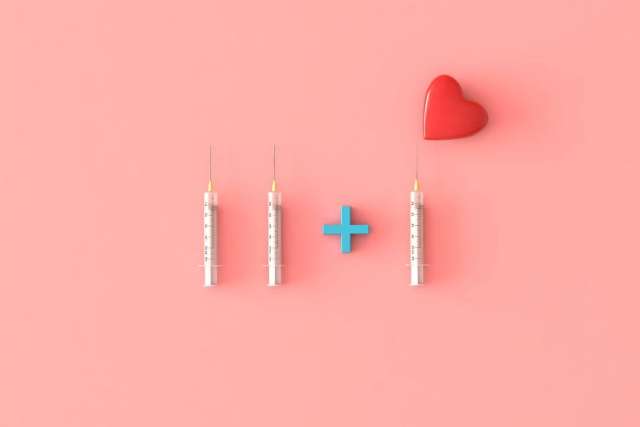Everyone understands what it means to give someone a boost. But when it comes to vaccines and immunity, the meaning isn’t always so clear.
Since the COVID-19 pandemic, the words “vaccine” and “booster” are on the tip of our tongues. But many people have questions about how it all works. If you’re vaccinated, why do you need a booster? And why don’t all vaccinations require boosters?
To help you make sense of how boosters work and why they’re important, we’ve answered five key questions:
What is a booster shot and what does it do?
A vaccine imitates an infection to teach your body’s immune system how to fight a specific pathogen or virus. When you get vaccinated, your immune system makes infection-fighting antibodies to attack the virus. After the fighting is done, some of those trained antibodies remain — always on the lookout for that virus— giving you a level of immunity.
Antibody levels can be measured to let us know that an appropriate immune response is in place. Sometimes it takes more than one dose of a vaccine to build complete immunity. Over time, antibody levels can naturally decrease, and the immunity created by some vaccines can fade.
That’s where a booster comes in — it’s needed to kickstart the immune response. A booster shot tricks your immune system into thinking it’s encountering the virus. In response, your body rebuilds your immunity by increasing the quantity and quality of the antibodies it makes.
Why do only some vaccines require boosters?
Experts don’t completely understand why acquired immunity lasts longer for some vaccines than others. One factor may be the rate at which a virus multiplies or mutates (changes). Some viruses, such as measles, are stable and not likely to mutate. As a child, you receive a two-dose vaccine to achieve lifelong immunity from measles. Other vaccines, such as the Tdap (tetanus, diphtheria and pertussis) shot, need a booster every 10 years to maintain immunity.
Keep in mind that high-risk scenarios, such as working in health care or traveling to a country with low vaccination rates, may require additional boosters. In some cases, your doctor may recommend you get boosted for a relatively stable virus.
Why is a COVID-19 booster recommended?
Experts weren’t initially sure a COVID-19 booster would be necessary. But once it became clear that vaccine protection seemed to decrease over time, they did recommend a booster. Like other boosters, the COVID-19 booster shot bolsters the body’s immune response to the virus.
COVID-19 boosters may also prove helpful in protecting against future variants of the virus. Most boosters are created as exact replicas of the initial vaccine, but they can be tweaked when needed. In the future, COVID-19 vaccines and boosters may be updated to address new variants — similar to strain-matched vaccines such as seasonal influenza (flu) vaccines.
Why is it important to get booster shots?
Boosters help you maintain immunity against viruses that can become serious or life-threatening. Once immunity wanes, your risk of serious illness and related diseases increases.
Keeping your immunity strong also protects others in your community. Infants, older adults and people with weakened immune systems are especially vulnerable to certain diseases and may not be able to get vaccinated.
How do you know if you need booster shots?
Your primary care physician can look through your medical history to see if you need any vaccinations or boosters. If you don’t have documentation of certain vaccinations, your doctor can test your blood for antibodies against the disease and vaccinate you if needed.
Always talk to your doctor if you have circumstances that may require additional virus protection, including:
- Chronic or new health conditions
- Working in health care
- Pregnancy or planning to become pregnant
- Traveling to a foreign country
To ensure you are up to date on your vaccinations and boosters, reach out to your primary care physician.



